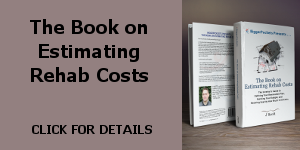Building Business Credit
A lot of business owners think that over the course of their business life, they will naturally build credit, and a lot of business owners are probably spread too thin to really focus on doing anything specific to building business credit. But, at least in the real estate investing world, credit is going to be key to opening a lot of doors and providing a lot of opportunity (as well as providing a safety net during those times when cash is tight).
Keep in mind that business credit is much different from personal credit. While you may have to secure any business credit against your personal assets for a couple years, the goal should be to build a strong enough credit history with your business that you are able to secure business credit only against your business assets, and not have to put your personal assets on the line. Additionally, in the real estate world, getting commercial credit lines — which don’t have the same qualification requirements and aren’t limited by your personal debt-to-income ratio or credit score — is one key to scaling an investment business.
Here is the 6 step process I would recommend to building credit for your business:
1) Create a Corporate Entity. This could be a full-fledged C-Corp, an S-Corp, or an LLC. The key is that you have created a legal entity separate from yourself and that can have a credit history and rating all to itself. There are a lot of differences between these types of business entities, and if you don’t know which one is most right for your specific business, talk to an accountant and an attorney to get some help.
2) Apply for an EIN. Once you have your business legally set up, you need to let the government and IRS know about your business. An EIN (Employer Identification Number) is analogous to a Social Security Number for your business. You can apply for an EIN free-of-charge online at the IRS website.
3) Get a Business Phone Line. This is actually an important step. The credit reporting agency that will likely be tracking your business credit (as well as the businesses that supply you credit) will want some proof that you are actually conducting business, and will also need a way to index your business in their databases. They do this using your business telephone number. In addition to just getting a business phone line, ensure that the business (and it’s associated phone number) are listed in both the 411 Directory (White Pages) and the Yellow Pages. Most phone companies that supply business lines will do this free-of-charge when you order your phone line. Because you need the Yellow Pages listing and the White Pages listing under the business name, you won’t be able to just get a residential phone line and call it a business line; and unfortunately, a business line will cost a little bit more.
3.5) Get a New Address (?) At this point, a lot of people will tell you that if you’re working out of your house, you need to set up a mail box (not a P.O. Box) at a local mailing center, so that your business doesn’t appear to be a home-based business. I’m not sure if this is a requirement or not, and have not set up an alternate mailing address as of yet. I want to see if I can skirt around this requirement…and will let you know if it works.
4) Apply for a DUNS Number. Dun & Bradstreet (D&B) is to the business world what Experian, TransUnion, and Equifax are to the personal credit world — they are the single biggest business credit reporting agency in the world. By going to their website or calling them, you can set up a D&B account and get an unique identifying number that will allow you to start building business credit through their credit databases. Beware that D&B will do their best to upsell you on tools to build your credit better and faster, and if that’s what you really want, go ahead and spend the money. But know that you don’t need to purchase any additional tools from D&B to start building your credit; that’s just how they make more money.
5) Open a Checking Account. Go to your preferred bank and tell them you want to open a business account. Try to find one that has few or no fees, if possible. They will ask for some details of your business, and will want to see your Articles of Incorporation and will need your EIN, so come prepared.
6) Start Applying for Credit. Get a business credit card (Amex and Advanta are highly recommended), open a Staples credit card, open a Dell business account, open a Home Depot account, or try opening business credit accounts at any of your preferred vendors and stores.
As you start building credit, you may notice that the stores/vendors stop requiring a personal guarantee for the credit lines. This is what you’re ultimately trying to accomplish — building business credit in the name of the business entity without impacting your personal credit or relying on it.




Hi again:
Thank you so much for your answer to my previous post. Regarding the business credit, did you get your DUNs number ? And did you choose thier credit file option by paying $599 or just got the number. And i was wondering how is your experience with them. i spent sometime speaking with their rep. I couldn’t decide should i buy their credit file or just get number and do it by myself.
Thank you in advance
Figen M.
What type of business entity would you recommend getting if your considering flipping/wholesaling/subject2 as your investment strategy? I am more focused on the long and short capital gain tax?
Kingster –
I’m not a CPA nor a tax attorney, so I don’t want to give tax advice. But, that said, my CPA recommend that my flipping business be structured as an LLC that is taxed as an S-Corporation. This provides me the liability protection I need (the LLC), and is somewhat beneficial for taxes for my flipping business.
Of course, this may or may not be right for you, depending on specifically what you’re doing. So, I would definitely recommend asking a CPA or accountant for his/her advice…
how far ahead should we be forming a corp? should we do this before we complete our first flip?
Newbie –
This is a personal decision. Here are the two best reasons to form a corp sooner rather than later:
– If you have a lot of personal assets that you need to protect in the case of a lawsuit, forming a corporation (or LLC) may provide that protection. That said, it’s also possible to get the same protection just by getting a large liability insurance policy;
– If you plan to do a number of real estate transactions this year, forming a business entity may provide some tax advantages that will allow you to save some money.
If you fall into either of those categories, you should probably consult an attorney and/or CPA sooner rather than later. Otherwise, wait until you have one or two flips under your belt, than use some of your profits to figure out the best business entity for your needs.
Scott,
Thanks for all the great information.
On your business plan, you wrote “hold each of its investment properties as a separate limited liability corporate entity”. Does this apply to your rental properties or your flip properties too? The overhead for applying for a separate LLC for each flip is high.
Grace
Grace, what I do is hold each rental in a separate LLC IF there is enough equity in each one that you would want to protect it. For flips it would not be necessary to hold each in it’s own LLC if you have created an LLC specifically for holding the houses you are flipping.
In GA creating an LLC is about $100 one time fee which is worth it to put each rental in.
Does that make sense?
Thanks Scott,
In LA, the tax on each LLC is $800/year.
I just talked to a lawyer. She suggested to hold each property in a Landtrust. There are some articles about Landtrust on BP. I’ll look into it.
Grace
Hey Grace,
Yup, LLCs in California can be expensive.
Personally, I don’t agree that you need to hold each flip in a separate LLC. Unless you have a large amount of equity in a given property, or unless you feel that your risk of liability is great (for example, if you don’t verify that all your contractors have insurance), then it’s probably safe to hold a couple properties in the same LLC. Of course, this is also dependent on the level of risk that you feel is acceptable.
That said, if you’re going to hold rental properties, it’s probably best to use a separate LLC for each, as your liability goes up when you have tenants.
Did you finally decide to get a P.O. Box or other external address? I don’t remember what you concluded in your book, but this seems like a good way to protect your privacy too…
Hi acm,
Yes, we use a UPS mailbox (appears to be a full address, but delivered to a local UPS Store).
J,
Thanks for the great info. Quick question: Do you purchase vehicles in LLC as well?
Hi Bret,
No, our vehicles are purchased in our personal name.
You say Amex and Advanta are highly recommended for a business credit card. However, Amex is not universally accepted, and Advanta was shut down by the FDIC. Any other, current recommendations?
Hi DG,
Sorry I missed this question earlier. Unfortunately, I don’t know what cards are now recommended for businesses. For the most part, I use my Amex for business transactions. I find that about 80% of vendors I use currently accept Amex. My backup card is a Chase Mastercard, for no other reason than I have the same type of card for personal use (so I had a relationship with the company).
Sorry I can’t offer better information…
I thank you for sharing what you know. Knowledge is power. Thanx